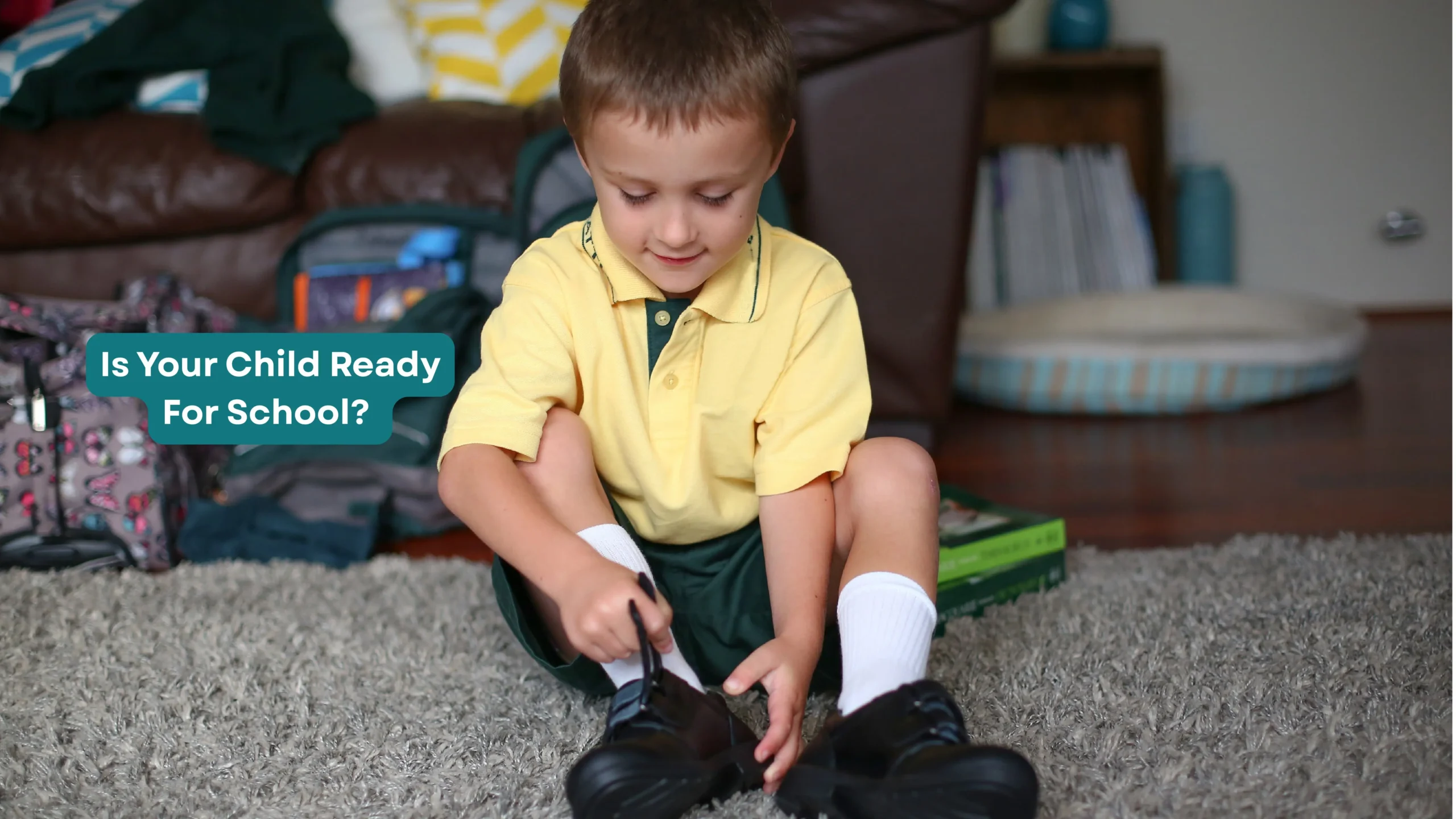
School Readiness in Australia (2025): Your Ultimate Checklist
Is your child ready for school?
Embarking on the journey to school is a significant milestone for both children & their families. Ensuring your child is prepared to thrive in a school environment involves more than just academic readiness; it encompasses a range of developmental areas.
Let’s explore what school readiness entails and how you can support your child during this transition.
What “school readiness” really means
School readiness refers to a child’s preparedness to engage successfully in a formal educational setting. This readiness is multifaceted, including:
- Social Skills: The ability to interact positively with peers and adults, share, take turns, and collaborate in group activities.
- Emotional Maturity: Managing emotions, coping with new experiences, and demonstrating resilience in the face of challenges.
- Language Skills: Effective communication, understanding and following instructions, and expressing needs and thoughts clearly.
- Cognitive Abilities: Basic problem-solving skills, curiosity, and the capacity to engage in age-appropriate learning tasks.
- Physical Development: Fine and gross motor skills, such as holding a pencil, using scissors, and participating in physical play.
It’s important to note that school readiness is not solely about academic knowledge like counting or recognising letters.
A holistic approach considers the child’s overall development to ensure a smooth transition into the school environment.
How to assess your child’s readiness for school
Determining if your child is ready for school can be challenging.
In Australia, while children must start school by a certain age, readiness varies individually.
Some parents consider delaying school entry to allow additional time for development, especially in areas like emotional maturity and social skills. For more information have a look at our article about “Deciding when to send your child to school” [insert link]
Engaging with professionals such as your child’s current pre-school or day care teachers, can provide valuable insights. School readiness assessments, conducted by child psychologists, evaluate various developmental domains to help make informed decisions about school commencement.
Some questions to ask
Here are some thoughtful questions you can ask your child’s current preschool teacher to help assess their school readiness:
General Development
How does my child interact with peers and adults in group settings?
This helps assess social skills, cooperation, and communication.
Does my child participate in group activities and follow instructions?
Understanding how well they can engage in structured environments is key for school readiness.
How well does my child manage transitions, such as moving from playtime to more structured activities?
This helps assess adaptability and emotional regulation.
Social and Emotional Skills
Is my child able to express their needs and emotions effectively?
This indicates emotional maturity and communication skills.
How does my child handle conflicts with other children?
This provides insight into problem-solving and emotional coping skills.
Does my child demonstrate resilience when things don’t go their way?
Resilience is essential for managing challenges in a school environment.
Cognitive and Language Skills
Does my child show curiosity and a willingness to learn new things?
This helps gauge cognitive engagement and readiness to learn.
How well does my child follow multi-step instructions?
This indicates their ability to process information and follow through.
Is my child’s vocabulary and language development on par with peers?
Language skills are crucial for classroom participation and learning.
Independence and Self-Help Skills
How independent is my child with tasks like dressing, toileting, and managing personal belongings?
Schools expect children to have a basic level of independence in daily tasks.
Does my child show confidence in attempting tasks on their own?
This helps determine their readiness to work independently in a classroom setting.
How well does my child concentrate on tasks or activities for extended periods?
Attention span is a key indicator of readiness for formal learning.
Physical Development
Are my child’s fine motor skills (e.g., using scissors, holding a pencil) and gross motor skills (e.g., running, jumping) well-developed?
These skills are important for writing, physical education, and other classroom activities.
Does my child have the stamina to participate in a full day of school activities?
Physical readiness is essential for managing the school day.
Additional Insights
What are your observations on my child’s strengths and areas for improvement in terms of school readiness?
This gives a holistic perspective from someone who has seen your child in different settings.
Do you recommend any activities or programs to further support my child’s readiness for school?
Teachers can offer valuable suggestions tailored to your child’s specific needs.
How does my child respond to structured learning versus free play?
This helps understand their balance of play-based and formal learning engagement.
Follow-Up
Do you think my child would benefit from starting school next year, or would they benefit from waiting another year?
This question helps with the final decision, especially if you’re considering delaying school entry.
How can I support my child’s transition to school?
Here are practical steps to enhance your child’s readiness for school:
- Encourage Play-Based Learning: Play is a natural way for children to develop essential skills. Activities that involve sharing, problem-solving, and creativity can boost social and cognitive abilities.
- Develop Routines: Establishing consistent daily routines helps children understand structure and expectations, making the school environment feel more predictable and less intimidating.
- Foster Independence: Encourage self-help skills such as dressing, toileting, and managing personal belongings to build confidence and autonomy.
- Promote Early Literacy and Numeracy: Engage in reading books together, discussing stories, and introducing basic counting in everyday contexts to stimulate interest in learning. Regular reading from an early age has been linked to better vocabulary and reading interest upon starting school.
- Visit the School Environment: Familiarising your child with their future school through visits can reduce anxiety and build excitement about this new adventure.
Every child develops at their own pace, and readiness for school is a personal journey. By focusing on a broad spectrum of developmental areas and seeking professional guidance when needed, you can support your child in making a confident and successful start to their educational experience.
FAQs – parents’ most-asked questions relating to school readiness:
Do private and public school cut-off dates differ?
Sometimes. Many independents align to state rules, but some set earlier cut-offs (e.g., March/April). Check the school’s admissions page.
Should I delay school if my child seems young?
It depends. Discuss with your preschool teacher; consider a readiness assessment for social-emotional maturity. Weigh benefits against costs (extra childcare year) and your state rules about age and exemptions.
What’s the first year called in each state?
NSW/ACT: Kindergarten · VIC/QLD: Prep (Foundation in VIC) · SA: Reception · NT: Transition · WA: Pre-primary· TAS: Prep
How can I build readiness at home?
Prioritise routines, independence (toileting, lunchbox, belongings), play-based learning, language (daily read-aloud), and school familiarisation visits.
What age do children have to start school in Australia?
New South Wales (NSW)
- Children must start school by 6 years old.
- They can start kindergarten if they turn 5 on or before July 31 in the year they start.
Victoria (VIC)
- Children must start school by 6 years old.
- They can start prep if they turn 5 on or before April 30 in the year they start.
Queensland (QLD)
- Children must start Year 1 in the year they turn 6 by June 30.
- They can start prep if they turn 5 by June 30 in the year they start.
(Prep is the first formal year of school and is compulsory in QLD.)
South Australia (SA)
- Children must start school by 6 years old.
- A mid-year intake was reintroduced in 2024 if they turn 5 before 1 May → start Term 1 (4 terms of Reception) or if they turn 5 1 May–31 Oct → start Term 3 (6 terms of Reception). Otherwise, they start at the beginning of the following year.
Western Australia (WA)
- Children must start school by 6 years old.
- They can start kindergarten if they turn 4 by June 30, and pre-primary is compulsory if they turn 5 by June 30.
Tasmania (TAS)
- Children must start school by 5 years old.
- They can start prep if they turn 5 by January 1 in the year they start.
Australian Capital Territory (ACT)
- Children must start school by 6 years old.
- They can start kindergarten if they turn 5 by April 30 in the year they start.
Northern Territory (NT)
- Children must start school by 6 years old.
- They can start transition (the equivalent of prep) if they turn 5 by June 30 in the year they start.
Ready to compare school options side by side? Compare your shortlisted schools here
Updated August 2025.
